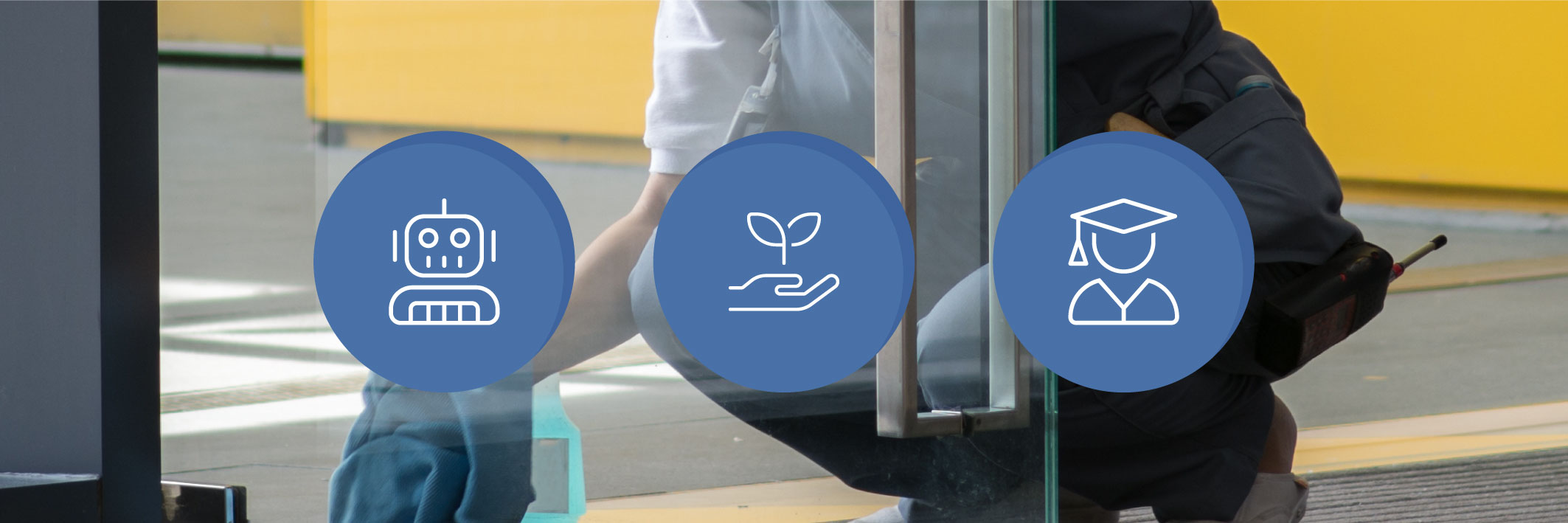One major challenge facing cleaning companies today is attracting and retaining the young generation. To stay relevant in modern times, the industry should embrace environmental- and social sustainability. They also need to address the less favourable aspects of cleaning jobs, while also promoting the positive impacts cleaning has that people tend to forget.
Why the Cleaning Industry has to Change
The cleaning industry is in a labour shortage, particularly with younger workers. Data from the British Cleaning Council reveals that the percentage of cleaning staff under 25 is significantly lower than in other sectors across the UK. Additionally, there is a much higher percentage of people over 55 in the cleaning industry. The difference may stem from the negative perception of cleaning work as low-skilled, low paid, with little career opportunity and workplace well-being.
To attract younger employees, the industry must shift its narrative. This requires reflection and action. Cleaning companies need to reflect and determine the most important issues and act on it. Otherwise, companies will increase the labour shortage when their employees start to retire and no young workers want to replace them. This requires knowledge of what younger generations seek in a job. They value sustainability, opportunity and skills, areas we will explain in more detail later.
During the COVID-19 pandemic, people realised the importance of the cleaning industry, yet as corona subsided, so too did the focus on its importance. Despite this, the cleaning sector remains vital for society, but a negative discourse remains the cause of low employment. This is why it’s crucial to showcase the benefits of working in cleaning.
Cleaning companies need to be vocal about how they ensure health and safety and create millions of jobs for both immigrants and natives, just to name a few. Moreover, it’s important for these companies to proactively address and improve the less positive aspects of the industry.
Misconceptions and Issues regarding Cleaning Staff
Many young people view cleaning as a stop-gap job — a way to earn money while you figure out what you really want to do in your professional life. Similarly, the cleaning business is viewed as a job for immigrants, because it’s one of the few sectors with minimal language requirements.
What people fail to realise, and what cleaning companies need to highlight, is the substantial skill and knowledge requirements. Effective cleaning requires knowledge of chemicals and anatomy, strong communication skills to meet diverse client needs, and organisational abilities to ensure that everything is completed on time. It also requires a certain amount of strength, despite technological advances in the industry.
For employer and employees, achieving these professional cleaning standards requires education and skill development through training or certification. This ensures that every employee has the latest knowledge and practices. For instance, cleaning supplies evolve and might require specific implementation training. Even though daily cleaning tasks do not require English language proficiency, offering English courses has several benefits. The workers can improve communicate and understanding the client’s needs, and it opens for other roles in the company. This not only enhances efficiency, but also counters the stigma of unskilled workers.
Another issue is working alone and at unconventional hours, which make cleaning an invisible and underappreciated work. It isolates the cleaning staff from the workforce who have a 9-5 schedule, resulting in loneliness. We are also in a cost of living crisis, where most people want full-time jobs, yet the cleaning industry usually only offers part-time.
An active effort to add social initiatives, moving towards working in the daytime and full-time, or working together in pairs, could be the key to change. Strengthening collegiality, and consistently recognising employees, are factors that ensure a supportive work environment and maintains a satisfied workforce.

Attracting the Young Generation with Sustainability, Opportunity, and Balance
To attract the next generation of workers, cleaning companies first need to learn what the youth value when choosing a career. Being the best in the industry attracts the top talent. Here are a few essential topics for attracting the young generation and how to focus on said topics:
Sustainability
Awareness of sustainability among companies is rising. This is gaining ground not only among companies but certainly also among the young generations. Recent 2023 research by KPMG reveals that 55 percent of 25-34 year olds and 51 percent of 18-24 year-olds expect sustainability commitments from their employer. Furthermore, one-third of 18-24 year-olds had declined job offers from companies whose sustainability efforts didn’t measure up to their own amount of commitment. Young workers both expect and require focus on sustainability.
When people talk sustainability, the usual topics are environment, social issues and human rights. Every company should focus on these topics, or highlight their existing efforts. Caring for these topics unites companies with the younger generation. Here are a few environmental and social initiatives, aimed at attracting the young generation, which also counter some negative sides of the cleaning business:
Environmental Sustainability
- Initiate recycling and waste sorting.
- Opt for cleaning products and brands who focus on environmental sustainability.
- Utilise sustainable energy wherever you can, e.g. in transport or electricity.
- Invest in technology that lessen consumption of products and water.
Social Sustainability
- Arrange social activities that strengthen collegiality and team spirit.
- Consider day-time cleaning, and team-cleaning schedules to reduce loneliness.
- Avoid application discrimination in the hiring process and gain a diverse and inclusive staff by focusing on qualifications and potential.
Opportunities and Career
When attracting the young generation, it’s important to emphasise long-term career opportunities and prestige in the cleaning industry. They often decide on a job with a long-term mindset. More than ever, education and knowledge seem to be a status symbol. Therefore, consider these initiatives when trying to make a cleaning career attractive to the youth:
- Provide access to certifications and education, both in terms of cleaning courses and language courses.
- Offer fair wages that reflect skill and dedication.
- Acquire the newest cleaning technology and adopt software management systems to position your company as modern and innovative.
Balance, Acknowledgement, and Pride
In this digital age, young people are exposed to global uncertainties and loss of social interaction, meaning that mental health and job security have become paramount. Therefore, being proud of your work and workplace while also managing a healthy work-life balance is essential for younger generations.
- Promote a healthy work-life balance, with clear routines and regular working hours, including daytime cleaning.
- Mental health focus with conversations, stress-management to reduce stress and sick days.
- Focus on quality service and send all the complements you receive to your employees.
- Pave the way for workplace pride with quality service.
- Implement social support, either to underprivileged employees, the local community, minorities and/or impoverished countries.
Changing and Improving for the Future Generation
The cleaning industry faces a great challenge: attracting and retaining young workers. This requires a transformation to overcome an outdated reputation while embracing a modern approach that focus on environmental and social sustainability. This means the industry must address its shortcomings and do a better job of highlighting the good things about a cleaning career. By making these changes, cleaning companies can appeal to younger individuals and secure the company’s future.
Interested in learning more about social sustainability and how to implement it? Then check out our article Social Sustainability and Its Positive Impact on Your Cleaning Business.



